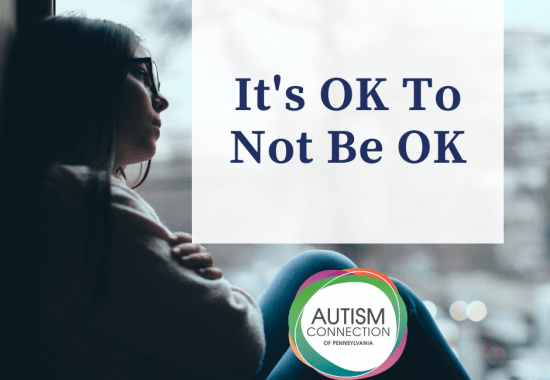I was reading an essay posted today by an autistic friend who is raising her kids with autism (using the words both ways, for now) as a single mom. I can very much relate to many of her feelings and behaviors of this week. It is easy to see pictures of projects completed, or read about people doing online learning, arts webinars, or completing picture schedules at the end of the day. But I wanted to get real about life for many others who are not doing or feeling okay right now. –Lu Randall, Autism Connection of PA Executive Director
Living with disability, differences, or disease means becoming accustomed to surprises, sometimes shocks, to the system. An old rehabilitation principle says that once a person loses control of their body, body part, or function (as in physical disability) they naturally need more control in other areas of their life. We can think of our need for control like water – or your beverage of choice – filling a glass. If something is dropped into the glass unexpectedly, the drink doesn’t go away, it just gets displaced.
Life in the age of COVID-19 may feel like that drink just got dumped all over the table – and the floor. Sure, we are not supposed to cry over spilled milk, but when I dropped and smashed my favorite mug yesterday (the one I got in Niagara Falls 15 years ago with my kids on a side trip, after a particularly hard visit to family – most of whom are always fantastic, but there is always one…). That mug to me meant we can move on and take care of ourselves and be in nature as an uplift. So when it broke…so did I, for a couple of minutes. And that is okay.
So if you have done zero activity outside of watching or reading the news, if your house is a wreck, meals are haphazard and school work untouched, I see you and I respect you. This whole mess is a grieving process. You may be familiar with the grief phases we are supposed to experience – denial, anger, sadness, bargaining, acceptance. Dr. Elizabeth Kubler Ross wrote about these last century. I first learned about Kubler Ross’s stages of grief in high school during a class on Death and Dying and I learned we do not experience these in order. Then later in ‘”real” life, I was texting with a friend who had just lost their spouse, and we mused about how Dr. Kubler Ross left out the stage called “Bacon.” I think there are lots of stages – maybe yours are Girl Scout cookies, or pajamas, or my fave “Sink Full O’Dishes.” What stages have you been in? Feel free to add yours in the comments.
You are still a good person if you are working to wrap your mind around everything.
If your kids or you are in regression, that is very likely not a permanent state.
Life will go on differently.
Let us know what help you need. We are still here to assist, and doing that helps us cope, too! So don’t be shy. And don’t try to be perfect, either – that’s just not okay.

